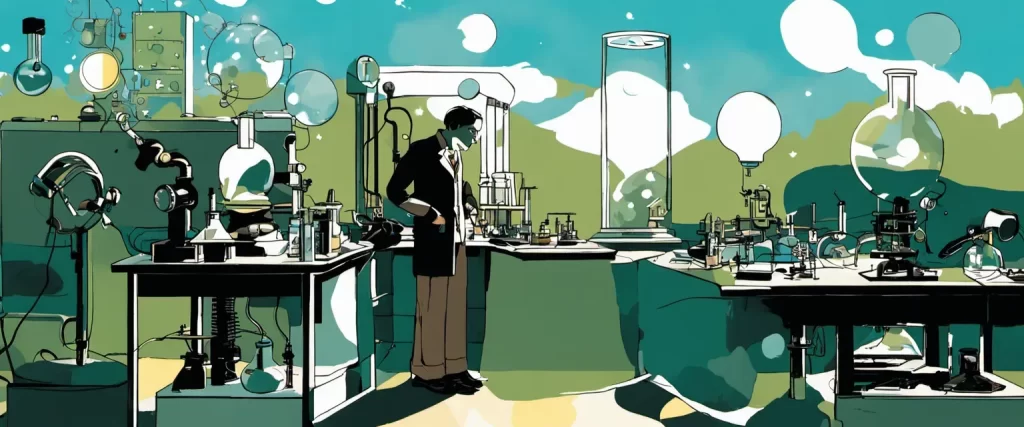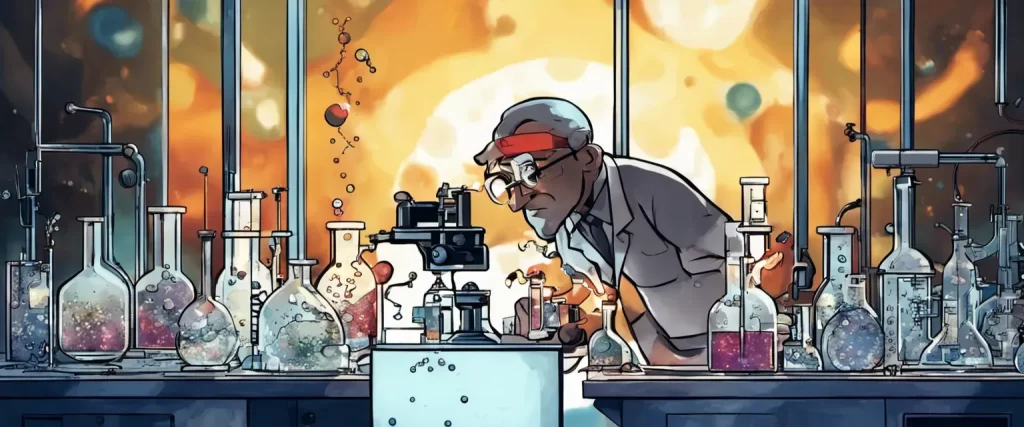
What is Science
Science is a systematic and organized body of knowledge that is obtained through observation, experimentation, and analysis. It is a method of understanding the natural world and explaining phenomena through the use of evidence and logical reasoning. Science seeks to uncover the laws and principles that govern the universe and provides explanations and predictions for various phenomena. It encompasses various fields such as biology, physics, chemistry, astronomy, and many others. The scientific method is typically followed in conducting research, involving the formulation of hypotheses, experimentation, data collection, analysis, and conclusion.
What Can We Get From Science
Science allows us to gain an understanding of the world around us and provides us with knowledge and information that can be used to benefit society in various ways. Here are some things we can get from science:
1. Knowledge and understanding: Science helps us understand the workings of the natural world, from the smallest particles to the vastness of the universe. It provides explanations and answers to our questions about the world and helps us make sense of complex phenomena.
2. Technological advancements: Scientific discoveries often lead to the development of new technologies that can transform our lives. From medical innovations to communication devices, science has a significant impact on the development of technologies that improve our quality of life.
3. Medical advancements: Science has greatly contributed to advancements in healthcare and medicine. It has enabled the discovery of life-saving vaccines, the development of effective treatments for diseases, and the understanding of the human body and its functions.
4. Environmental preservation: Science helps us study and understand the impact of human activities on the environment. It allows us to develop strategies for conserving natural resources, reducing pollution, and mitigating the effects of climate change.
5. Innovation and economic growth: Science and technological advancements drive innovation and economic growth. Scientific research leads to the development of new products, services, and industries, which create jobs and stimulate economic activity.
6. Evidence-based decision making: Science provides a systematic and objective approach to gathering and analyzing data, which can be used to inform decision-making processes. It helps policymakers, businesses, and individuals make more informed choices based on empirical evidence and reliable information.
7. Critical thinking and problem-solving skills: Science encourages critical thinking, curiosity, and the ability to ask questions. It helps develop problem-solving skills and fosters a mindset of inquiry and discovery.
8. Cultural and societal progress: Science has played a crucial role in shaping our knowledge, culture, and society. It influences our attitudes, values, and belief systems and contributes to the advancement of human civilization.
In summary, science offers us knowledge, technological advancements, medical breakthroughs, environmental sustainability, innovation, evidence-based decision making, critical thinking skills, and societal progress.
Strategies in Learning Science
1. Develop a strong foundation: Start by understanding the basic concepts and principles of science. This will provide you with a strong foundation on which you can build upon as you progress.
2. Focus on understanding, not memorizing: Science is all about understanding how things work and why they happen. Rather than memorizing facts, focus on understanding the underlying principles and concepts.
3. Active learning: Actively engage with the material by taking notes, asking questions, and participating in class discussions. This will help you retain information better and reinforce your understanding of the subject.
4. Practice critical thinking: Science often requires critical thinking skills to analyze and evaluate information. Practice critically analyzing research papers, experimental results, and scientific theories.
5. Conduct experiments: Hands-on experimentation encourages active learning and helps solidify your understanding of scientific concepts. Conduct simple experiments at home or join science clubs or workshops where you can perform experiments with guidance.
6. Utilize visual aids: Science often involves complex diagrams, graphs, and charts. Utilize visual aids to help you understand and remember information better. Create concept maps, draw diagrams, and find visual representations of scientific concepts.
7. Seek clarification: If you don’t understand a concept or idea, don’t hesitate to ask for clarification from your teacher, classmates, or online resources. It’s important to address any gaps in understanding to build a strong foundation.
8. Review regularly: Science is cumulative in nature, so regularly review and revise what you have learned. This will help reinforce your understanding and prevent forgetting important concepts.
9. Connect science to real-life applications: Find ways to relate scientific concepts to real-world situations. Understanding how science is applied in everyday life can help make the subject more interesting and relatable.
10. Collaborate with peers: Study with classmates who are also interested in science. Discussing complex ideas and challenging one another can enhance your understanding and improve your learning experience.

Frankenstein by Mary Shelley
Summary
Frankenstein” by Mary Shelley is a Gothic novel that centers around the story of Victor Frankenstein, a young scientist who becomes obsessed with creating life. The novel is presented through multiple narratives and opens with Captain Walton and his crew encountering Victor on their Arctic expedition. Victor shares his life story, revealing how he progressed from a passion for science to creating a monstrous being.
Victor’s journey begins during his childhood in Geneva, where he immerses himself in his studies and eventually attends university in Ingolstadt, Germany. There, he becomes driven to uncover the secrets of life and death, which leads to his creation of a creature from various body parts. Frankenstein’s monster, however, turns out grotesque and terrifying, causing Victor remorse and horror at his own creation.
The creature, abandoned by Victor, seeks companionship and understanding, but is met with fear and rejection from society. It begins a cycle of violence and revenge, ardently pursuing Victor and destroying everything dear to him. The monster resents Victor for his abandonment, the cruelty he faces from humanity, and his perpetual loneliness.
Throughout the narrative, Shelley raises important questions about the responsibility of creators towards their creations, the ethical implications of scientific advancement, and the consequences of human isolation. The novel delves into themes of ambition, hubris, and the blurred lines between creator and creation.
In the end, Victor and the creature engage in a final confrontation in the Arctic, leading to Victor’s demise. The creature, burdened by guilt and remorse, laments his actions and vows to end his own life, disappearing into the Arctic wilderness.
“Frankenstein” remains a significant work in literature due to its exploration of complex moral and philosophical issues, its depiction of the dangers of unchecked ambition, and its themes of isolation, empathy, and the consequences of playing God.
Reasons for Recommendation
1. Exploration of scientific ethics: Mary Shelley’s Frankenstein raises important questions about the ethical implications of scientific advancements. The novel prompts readers to consider the responsibility scientists have towards their creations and the potential consequences of playing with the boundaries of science.
2. Examination of scientific ambition: The book delves into the dangerous aspects of unchecked scientific ambition. It warns against the pursuit of knowledge without proper consideration for the potential risks and consequences, highlighting the dangers of pushing the boundaries of science without a moral compass.
3. Reflection on the relationship between creator and creation: Frankenstein explores the complex relationship between Victor Frankenstein (the creator) and his creature. The novel demonstrates the consequences of a failure to take responsibility for the outcomes of scientific experiments, emphasizing the importance of accountability for scientific advancements.
4. Understanding the power of science: The book delves into the transformative power of science and its potential to alter the course of humanity. Frankenstein’s creation challenges the conventional understanding of what it means to be human, opening up discussions on the evolving dynamics between science and the human condition.
5. Exploration of scientific limitations: Frankenstein also reveals the limitations of scientific progress by showcasing the unintended consequences of Frankenstein’s experiments. The novel reminds readers that science, while capable of great achievements, has inherent boundaries that must be respected.
6. Reflection on societal perceptions of science: Through the portrayal of Frankenstein’s creature, Shelley highlights society’s tendency to fear the unknown and reject scientific advancements. The book prompts readers to critically examine their own biases and understand the importance of evaluating scientific progress in a balanced and informed manner.
7. Reflection of societal anxieties regarding advancements: Written during the early 19th century, Frankenstein encapsulates the anxieties of Shelley’s time regarding scientific discoveries and technological progress. By understanding these historical concerns, readers can reflect on the parallels with contemporary society and consider the potential risks of current scientific advancements.
In summary, Frankenstein offers a compelling exploration of scientific ethics, ambition, responsibility, and the transformative power of science. The book invites readers to critically examine scientific progress and consider the consequences of unchecked ambition in the pursuit of knowledge.

The Demon-Haunted World by Carl Sagan
Summary
The Demon-Haunted World: Science as a Candle in the Dark” is a book written by renowned astrophysicist Carl Sagan, published in 1995. The book explores the role of critical thinking, skepticism, and the scientific method in a world infiltrated by pseudoscience, superstition, and irrational beliefs.
Sagan emphasizes the importance of a scientific approach in evaluating claims and distinguishing between genuine knowledge and unfounded beliefs. He raises concerns about the dangers of an increasingly scientifically illiterate society that is vulnerable to manipulation and deception. Sagan addresses specific topics such as alien abductions, psychics, UFO sightings, and faith healing, using logical arguments and scientific evidence to question their validity.
The book also delves into the realms of education, media, and politics, highlighting the need for scientific literacy to inform public policy decisions. Sagan encourages his readers to think critically, ask questions, and develop a skeptical mindset, while also acknowledging the limits of science and the importance of being open to new evidence.
“Demon-Haunted World” concludes with a hopeful message, emphasizing the wonders of the cosmos and the potential for scientific exploration to enlighten and inspire humanity. Sagan advocates for a future guided by reason, evidence, and the scientific method, as a means to combat ignorance and safeguard against the threats posed by irrationality and superstition.
Reasons for Recommendation
1. Promotes the scientific method: “The Demon-Haunted World” emphasizes the importance of using evidence-based reasoning and the scientific method to understand the natural world. This book encourages readers to question claims and beliefs, challenging them to seek empirical evidence before accepting any proposition.
2. Cultivates critical thinking: Sagan highlights the necessity of critical thinking as a means of navigating a world filled with misinformation and pseudoscience. The book equips readers with the tools to analyze and evaluate arguments, encouraging skepticism and intellectual curiosity.
3. Debunks myths and superstitions: “The Demon-Haunted World” offers a thorough examination of numerous myths and superstitions, debunking them through logical analysis and scientific evidence. It exposes the danger of blindly accepting supernatural explanations without rigorous examination.
4. Fights against pseudoscience and debunked beliefs: Sagan delves into various pseudoscientific beliefs such as UFO sightings, astrology, and alien abductions, using scientific evidence to dismantle them. This book provides readers with the knowledge and confidence to distinguish between genuine scientific inquiry and unfounded claims.
5. Encourages science literacy: Sagan underscores the importance of science literacy for all individuals in a modern society. He argues that understanding the basic principles of science is crucial for informed decision-making and for addressing societal challenges such as climate change, medicine, and technology.
6. Explores the wonders of scientific discoveries: While critiquing unscientific claims, Sagan also celebrates the countless wonders of scientific exploration and discovery. Through captivating narratives and personal anecdotes, he invites readers to appreciate the beauty and vastness of the universe, inspiring awe and fascination.
7. Advocates for the application of science in everyday life: Sagan argues that science should not be confined to laboratories and academic settings but should influence our daily lives. From encouraging evidence-based medicine to promoting the responsible use of technology, “The Demon-Haunted World” shows how scientific thinking can positively impact society.
8. Evokes a sense of wonder and curiosity: By presenting science as a mindset and a way of engaging with the universe, this book fosters a sense of wonder and curiosity about the natural world. It encourages readers to explore, ask questions, and seek knowledge, ultimately inspiring a lifelong interest in scientific inquiry.
Chimpanzee Politics by Frans de Waal
Summary
Chimpanzee Politics: Power and Sex among Apes” by Frans de Waal is an intriguing exploration of the social and political dynamics within a group of captive chimpanzees. The book delves into the complex interactions and power struggles that mimic human politics, providing insights into the nature of dominance, alliances, and social hierarchy.
De Waal, a renowned primatologist, uses the Arnhem colony of chimpanzees in the Netherlands as his research subject. He chronicles the long-term observations made over several years, examining the behavior of individual chimpanzees and the way they navigate the social landscape.
The book begins by introducing the main players and describing their distinct personalities. De Waal then delves into the intricate power dynamics within the colony. He uncovers the role of alliances, backstabbing, and strategic maneuvering among the chimpanzees as they vie for power and influence.
Using vivid anecdotes, de Waal illustrates how alliances are formed and broken, and how individuals climb the social ladder. He also discusses the importance of reconciliation and conflict resolution in maintaining group stability.
Furthermore, the book explores the intricate relationship between power and sex among the chimpanzees. Sexual behaviors are used as tools for maintaining alliances and asserting dominance, revealing the complex interplay between social and sexual dynamics.
Throughout the book, de Waal draws parallels between the behavior of chimpanzees and human political systems, highlighting the evolutionary roots that humans share with their primate relatives.
“Chimpanzee Politics” offers a captivating window into the social lives of our closest animal relatives, shedding light on both the similarities and differences between humans and chimpanzees. Through his meticulous observations and engaging storytelling, de Waal provides readers with a thought-provoking and entertaining exploration of the political nature ingrained in us all.
Reasons for Recommendation
1. Scientific rigor: “Chimpanzee Politics” is renowned for its thorough scientific research and analysis. Frans de Waal, a prominent primatologist, presents evidence and observations drawn from extensive fieldwork and laboratory studies. The book adheres to the principles of scientific methodology, making it a reliable source of knowledge on chimpanzee behavior.
2. Insight into primate social dynamics: Through his detailed observations, de Waal offers deep insight into the social dynamics of chimpanzee communities. He explores complex topics such as power struggles, alliances, aggression, and reconciliation. By studying these behaviors in chimpanzees, known to be our closest living relatives, the book sheds light on the evolutionary roots of human social behavior.
3. Revealing the origins of political behavior: Chimpanzees exhibit various aspects of political behavior within their societies, such as forming alliances, manipulating others, and competing for power. “Chimpanzee Politics” not only uncovers these behaviors but also draws intriguing parallels to human politics. This exploration provides a unique perspective on the evolutionary origins of political behavior in our own species.
4. Challenging human exceptionalism: The book challenges the long-standing notion of human exceptionalism by highlighting the similarities between chimpanzee and human societies. By showcasing the intricate and strategic behaviors within chimpanzee social groups, de Waal argues for a more nuanced understanding of animal intelligence and complex social systems.
5. Engaging and accessible writing style: de Waal’s writing style makes the complex scientific concepts and research accessible to a wider audience. Even readers with limited scientific background can understand and appreciate the insights presented. The book’s engaging narrative and anecdotes make it a captivating read that seamlessly merges scientific knowledge with storytelling.
6. Contributions to the field of primatology: “Chimpanzee Politics” has played a significant role in advancing the field of primatology. It has inspired and influenced numerous researchers, students, and scientists interested in primate behavior and evolution. Reading the book provides an opportunity to explore the seminal work that has shaped our understanding of primate social dynamics.
7. Thought-provoking implications for human society: By highlighting the complexity and nuances of chimpanzee social behavior, “Chimpanzee Politics” invites readers to reflect on their own social interactions and political systems. It prompts deeper reflection and critical thinking about the factors influencing human decision-making, power dynamics, and social hierarchies.